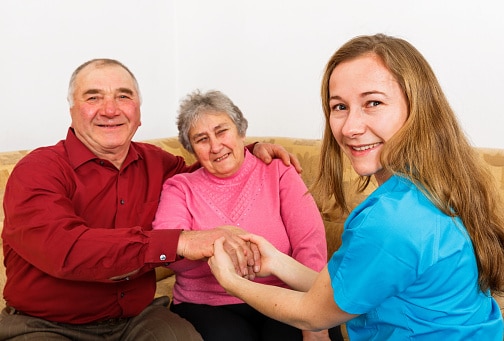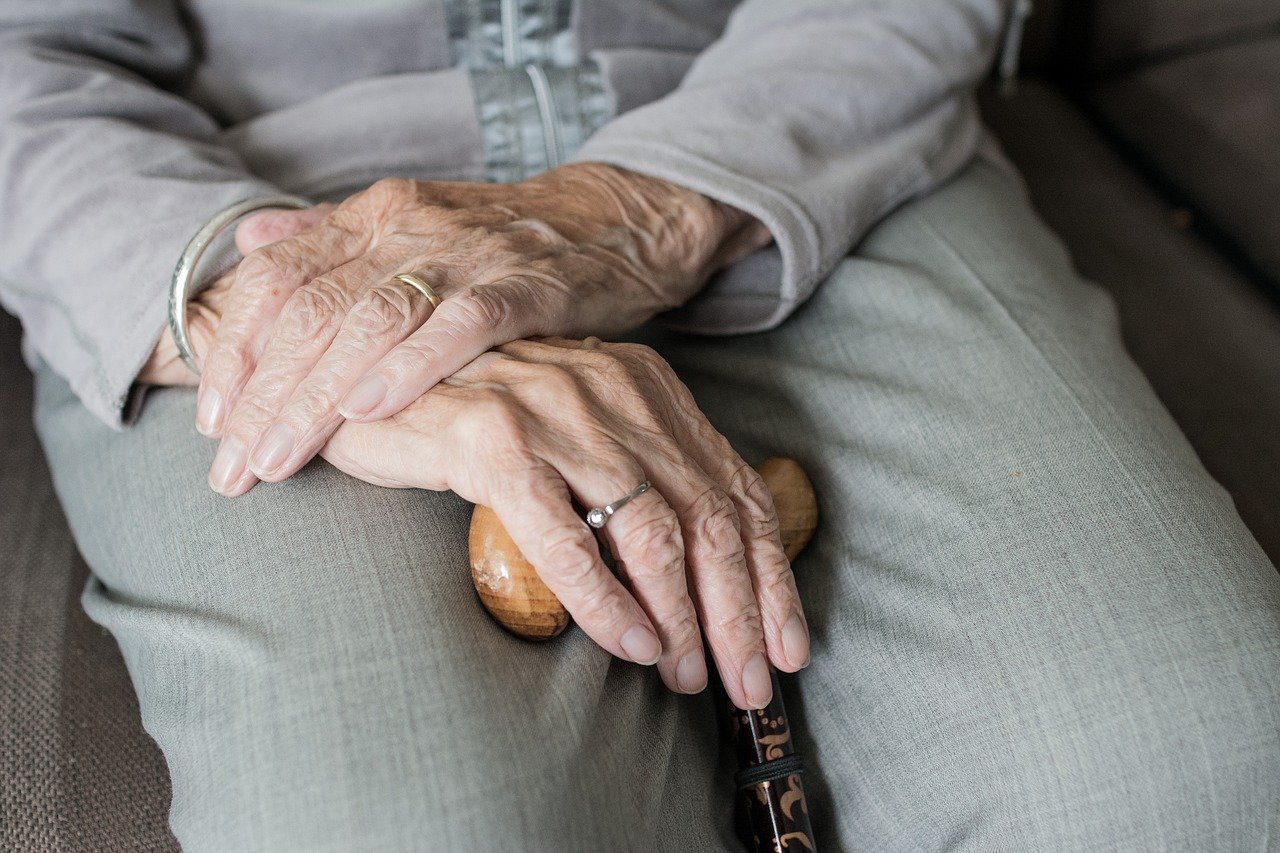
5 Must-Knows About Eating Habits in Late-Stage Dementia
Over time, you may notice changes in your loved one’s eating habits in late stage dementia. While loss of appetite is a normal phenomenon, it’s important to understand how to make mealtime comfortable, nourishing, and safe for your loved one.
Let’s go through some key must-knows about late stage dementia loss of appetite and other common eating challenges.
1. Changes in your loved one’s eating habits is normal.
To start, people living with dementia may experience changes in their diet, including how much they eat and what foods they’re interested in.
In particular, it’s typical for those with late stage dementia to eat much less than usual. They may even show challenging behaviors at the table, such as becoming agitated, refusing food, or spitting out food.
This can happen for a variety of reasons, such as your loved one:
- Not recognizing when they’re hungry or thirsty
- Forgetting to eat and/or drink, or not remembering what they like
- Experiencing changes in flavors or preferences
- Struggling to follow doctor-recommended or religious/cultural diets
- Struggling to handle cutlery
- Experiencing difficulty swallowing
- Having ill-fitting dentures
- Getting distracted by the dining environment
- Losing concentration during mealtime
- Struggling to recognize food
- Having trouble communicating needs or preferences
You should keep these challenges top of mind as you work with your loved one to ensure an adequate level of food and nutrition.
2. Loss of appetite is part of the body’s natural course.
As dementia progresses, your loved one may experience physical changes that impact the ability to eat as usual. For example, he/she may lose control of swallowing over time, leading to difficulty eating.
Another factor is that your loved one is most likely more sedentary than previously. In this case, the body doesn’t need as many calories to sustain energy throughout the day, leading to a decreased level of appetite and new eating habits.
It’s also possible that your loved one is facing a loss of appetite due to medication, or because he/she is struggling with elderly depression. If you believe this is the case, you should talk to your loved one’s physician to find out how to minimize the impacts of medication or depression.
Finally, in late stages of dementia, the body begins to slow down and reduce intake of food and drink. For many, the sensations of hunger and thirst disappear completely. This loss of appetite may become more acute towards end of life.
3. You can promote better eating habits by tweaking the way you prepare food.
Luckily, you can make small changes to promote a stronger appetite in your loved one.
First, you should prepare meals at regular times every day, so your loved one can be prompted by routine. Ensure there’s enough time to enjoy the meal, so you’re not putting pressure on your loved one either.
Make familiar, favorite foods and try to provide an appealing assortment of tastes, textures, colors, and temperatures. Don’t worry too much if the combinations are unusual – it’s more important for your loved one to get the nutrition he/she needs.
Remember that it’s okay if things get messy. Trying to control tidiness may lead to your loved one feeling upset or confused. Simply use easy-clean mats if you’re worried about this.
Pro tip: Finger foods can be the perfect choice for those with dementia. Try sandwiches, rolls, slices of fruits/veggies, and even meals cut into bite-sized pieces. In addition, smoothies or shakes are a great idea to add extra calories and nutrients. Offering a smoothie as a snack may be more appealing than a piece of fruit, for example.
In addition to these suggestions, be sure to:
- Maintain your loved one’s personal preferences and practices. For example, if your loved one was a vegetarian before dementia, try to uphold their practices – even if they don’t remember them.
- Place snacks in easily visible places throughout the house. This may stimulate appetite and prevent your loved one from trying to eat items that aren’t food, such as soap.
- Don’t overlook hydration either. Offer beverages often, including a variety of hot and cold drinks. This may include coffee, tea, juice, smoothies, soup and more.
4. Presentation matters, too. Try to create a friendly dining atmosphere.
Besides the food itself, the way you present it can change your loved one’s mealtime experience. You can promote appetite in a few keys ways, such as:
- Presenting one food at a time, so your loved one doesn’t get overwhelmed.
- Choosing plain place settings with colors that contrast with the foods you’re serving.
- Creating a relaxing atmosphere with your loved one’s favorite music and by using a calm tone of voice.
- Offering social stimulation during meals, with some questions or sharing.
- Eating with your loved one so they can see your example and follow it.
In many ways, the dining atmosphere is just as important as the foods you serve at the table. You can build trust with your loved one by making mealtimes more dementia-friendly.
5. Don’t overlook your own diet. As a caregiver, you need energy and nutrition.
While you may be concerned about your loved one’s eating habits in late-stage dementia, don’t forget about your own as well. The healthier you eat, the more energy you’ll have. It also sets a good example for your loved one to see what you’re eating and understand mealtime as a normal daily event. Don’t overlook your own nutrition and be sure to ask for help if you need it.
Boost your loved one’s late stage dementia diet and more
Diet is just one aspect of living with dementia. As you boost your loved one’s eating habits in late-stage dementia and make the dining experience as smooth as possible, check out all our dementia resources. Here you can get access to a dementia caregivers guide, as well as articles about:
- Early signs of dementia
- Activities for dementia patients
- Top dementia books for caregiving
- Top toys for dementia patients
- Top gifts for people with dementia
- All about the SAGE dementia test
- and more!
Sources:
- Dementia – Eating, Better Health, https://www.betterhealth.vic.gov.au
- Changes in Eating Habits and Food Preference, Alzheimer’s Society, https://www.alzheimers.org.uk
- Poor Appetite and Dementia, Alzheimer’s Society, https://www.alzheimers.org.uk
- Food and Eating, Alzheimer’s Association, https://www.alz.org
Related Articles

Elder Law Attorneys: A Comprehensive Guide
If you are someone who is taking care of a senior or has an elderly loved one, you should consider working with an elder law attorney. Though you may not expect it, individuals begin to face new and more complex legal concerns as they get older. Actions that may have seemed trivial when they were […]

When Is It Time for Assisted Living?
Wondering if it is time for assisted living for your loved one is a common question for caregivers. As a caregiver, you might have been considering the question for months or possibly even years. Your loved one might have declined to continue the discussion as the thought of moving out of their family home and […]

All About Adult Day Care: Community and Costs
Adult day care is a fairly new concept for caregivers. The basic idea is to provide a secure place where seniors can enjoy social activities during the day and be provided nursing care as needed. It’s a hybrid model of eldercare that prioritizes community. At the same time, seniors get help with common custodial tasks […]

Respite Care: An Overview
Caregiving can be overwhelming at times. That’s why taking a break is essential for recharging your battery. Respite care, also called short break care, is a way for caregivers to get temporary care for their loved ones so they can take some time to rest. Getting this “me time” of respite care can renew the […]

An Overview of Senior Rehabilitation Centers
Recovering from injury or illness in your golden years may take time and support. That’s where senior rehabilitation centers become essential. If you need a temporary stay to recover from injury or illness, senior rehabilitation centers can be the solution to get expert care and daily support. In this article, we’ll give you an overview […]

A Caregiver’s Guide to ADLs and IADLs
This article has been medically reviewed by Dr. Martin Duggan in 2021. This content is not intended to be a substitute for professional medical advice, diagnosis, or treatment. Always seek the advice of your physician or another qualified health provider with any questions you may have regarding a medical condition. As a family caregiver, your […]